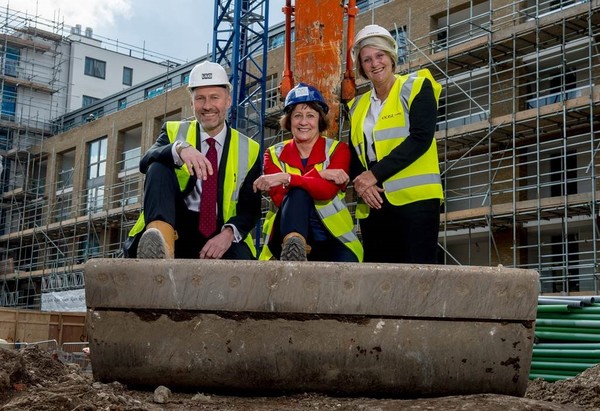You are viewing 1 of your 1 free articles
Knuckle down
L&Q, Hyde and East Thames’ three-way merger plan shows associations knuckling down and getting on with the job in the face of government cuts, says Elaine Bailey.

Housing associations haven’t had it easy in the last year – a 1% rent cut every year for the next four years forced my association alone to find £35m-worth of savings or cut our development programme.
You would expect me to be moaning and criticising every politician that came within 10 metres. Except I haven’t. Maybe the government had a point when it said we could increase efficiencies and build more homes?
Councils up and down the country have been facing budget cuts for years and its not over yet. It’s time we stepped up to the plate.
Today’s exciting announcement of a merger between three of London’s leading housing associations, Hyde Group, L&Q and East Thames, is the start of that process.
Together, we can do more than we can apart – building an ambitious 100,000 homes in 10 years, 35,000 more than would have been possible to build alone.
This is a £25bn investment in homes for a range of different tenures and an acknowledgement that the responsibility falls on us to help solve the housing crisis in London and the South East.
“Together, we can do more than we can apart – building an ambitious 100,000 homes in 10 years, 35,000 more than would have been possible to build alone.”
However, we can only do this by achieving considerable savings. By joining forces, we will deliver efficiencies of £50m a year within five years – above those we’d already committed to as stand-alone organisations.
We will do this primarily through combining back-office functions as well as investment in IT, increased purchasing power and flexible working. We need to be chained to our desk less and out in the communities we serve more, by getting closer to our residents and spotting problems before they arise. In short, I want my staff to be more responsive, innovative and agile.
We know we don’t always get it right, but we are determined to become the future landlord and employer of choice.
We can do this in a number of ways, one of which is investing £5m a year in a new training academy, providing nationally accredited apprenticeship schemes and career development opportunities not only for our staff but for our residents too. Building 100,000 homes in an industry already facing a skills shortage is a challenge we have decided to tackle head on.
Unearthing the efficiency savings that I am confident can be found doesn’t mean we will fall short in our commitment to quality services – in fact, quite the reverse. Alongside our training academy, we will be investing £250m in community projects.
“We have been responsible and are partly to blame for the dependency culture we have created.”
However, we will also be asking our residents to take more personal responsibility in respecting their homes and making an effort to help themselves. For too long, housing associations have picked up the bill for damage or repairs that we are not responsible for.
The odd toilet seat fix here, a lightbulb replacement there adds to millions of pounds of help. But worse than that, we have been responsible and are partly to blame for the dependency culture we have created. By putting a stop to this, we can focus help where it is really needed, with the most vulnerable, the ones who do not shout the loudest, such as the older lady who will sit without heating instead of calling our contact centres for help.
We also need to get with the times. Our residents want to use us like they use Amazon; whether that is 11pm at night or six o’clock in the morning, we need to design services online to meet that demand. Why shouldn’t you book in a repair at night when you have had a busy day at work?
Why call a contact centre for a straightforward query that we can answer on our website or via a live chat? Our residents are just as likely to be leaseholders with busy jobs or living in shared ownership as unemployed on housing benefit. Moving forward, we must cater for all types of tenure, housing the young and old alike.
So we had two choices when the government decided to get on our case – fight back and moan like hell or knuckle down and get on with the job we were asked to do.
Today we have taken a massive leap forward in doing just that, by embracing this new relationship where we are more likely to succeed together than on our own.
Elaine Bailey, chief executive, Hyde Group, and deputy chief executive designate of the merged organisation










